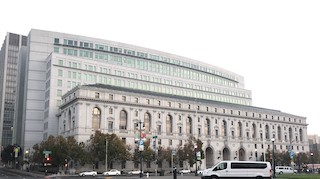When the judge sentenced Jones, the judge did not consider striking the firearm use enhancement or not imposing the five-year prior serious felony conviction enhancement. By law, if a judge did not know he or she had such discretion in sentencing, that failure to know constitutes an abuse of discretion in sentencing, meriting resentencing.
Moreover, more recent legislation passed into law, effective January 1, 2022, also applied, Jones argued. Senate Bill 567 modified Penal Code § 1170(b) and Assembly Bill (AB) 518 modified Penal Code § 654.
 Court of Appeal First Appellate District San Francisco
Court of Appeal First Appellate District San Francisco
Senate Bill 567 amended Penal Code § 1170(b) to specify that, when a sentencing judge chooses a term from a statutory triad, the chosen term shall not exceed the middle term unless the facts supporting the aggravating circumstances are: (1) established by defendant’s stipulation to them; or (2) proven to a jury (or to a judge if a jury is waived) beyond a reasonable doubt., or (3) based on prior convictions evidenced by a certified record of conviction. Jones contended the judge imposed the upper term for attempted murder on grounds that do not meet these requirements.
Senate Bill 567 also added a provision that required the judge to impose the low term if defendant’s psychological, physical, or childhood trauma was a contributing factor in the commission of the offense, “unless the court finds that the aggravating circumstances outweigh the mitigating circumstances [so] that imposition of the lower term would be contrary to the interests of justice.” As to this provision, Jones stated that his probation report states that Jones’ father was charged with murdering his mother and that Jones dropped out of high school in the 12th grade following her death.
Assembly Bill 518 also applied, Jones argued, as it amended Penal Code § 654(a) to state: “An act or omission that is punishable in different ways by different provisions of the law may be punished under either of such provisions, but in no case shall the act or omission be punished under more than one provision.” Previously, a judge was required to impose the sentence that “provides for the longest term of imprisonment” and stay execution of the other term. Section 654 now provides the trial court judge with discretion to impose and execute the sentence on either term, which could result in the trial court imposing and executing the shorter sentence rather than the longer sentence.” People v. Mani (2022) 74 Cal. App. 5th 343, 379.
The prosecutor agreed with Jones that because his sentence was not final, he was entitled to retroactive application of SB 620 and SB 1393, as well as SB 567 and AB 518, as these new statutes constituted ameliorative changes to the law.
The First Appellate District vacated the sentence and remanded the case for resentencing.
In presenting this summary, we ask the reader to note that these new sentencing laws are only available to nonfinal sentences, not cases wherein the sentence is final, meaning where the time to file an appeal in the case has expired.
The citation for the First Appellate District Court ruling discussed above, which is certified for partial publication only, is People v. Leonard Jones (1st App. Dist., 2022) 79 Cal. App. 5th 37, 294 Cal. Rptr. 3d 355.
For more information about resentencing under the recent new laws, please click on the following articles:
 Court of Appeal First Appellate District San Francisco
Court of Appeal First Appellate District San Francisco